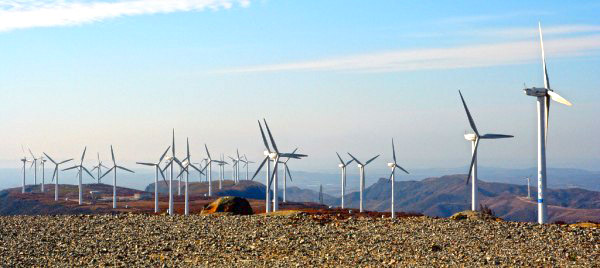The notion that global warming is just a mental construct is damaging Australia’s climate response as well as its opportunities for technical leadership. [9 September 2014 | Peter Boyer]

One of China’s first wind farms, in Mulan, Heilongiang Province. Since 2009 China has been the world’s largest producer of wind turbines. PHOTO LAND ROVER: OUR PLANET
The science of climate is complex, as we know, but it seems dead simple alongside another great conundrum of our age, how to get people and governments around the world to respond effectively.
Here’s a confession: I can be slow to acknowledge an error. But I’m among many friends. Psychologists say that when faced with stark evidence that they’re wrong, people will commonly “change” the evidence to match their position.
Now, confronted by evidence that our present pattern of fossil fuel use will bring intolerable temperature rises within our children’s lifetimes, we behave as if it’s just a mental construct.
The English environmental thinker George Marshall, whose video presentations I’ve long admired, has just written a book with a title that says it all: “Don’t even think about it: why our brains are wired to ignore climate change”.
Marshall points to our “loss aversion”, a term coined by Nobel prizewinning psychologist Daniel Kahneman to describe a natural human tendency to be more sensitive to losses than gains.
This is exactly what we don’t need in dealing with global warming, where we have to make sacrifices now to avoid losses that are many years or decades away. The result can be psychological paralysis.
Marshall has identified a related deep-seated impediment to our acting on climate change: the “passive bystander” effect. We tend to put our group’s collective responsibility ahead of our personal responsibility, and wait for someone else to act, because that’s how we evolved.
This may all sound like just another academic mind-trip, but far from it. As Marshall and many others attest it’s a key to the big political and social shifts needed to deal with climate change. In that battlefront, China looms large.
The Australian debate during the past decade has been dominated by talk about how rapidly-rising Chinese carbon emissions are dwarfing our own, rendering ineffectual and irrelevant our own puny attempts to cut emissions at home. This is the passive bystander effect at work.
Australia’s 1.5 per cent of global emissions seems tiny set against China’s carbon emissions, now about a fifth of the world total. So some business and political leaders ask, why should we lift a finger and risk being at a trading disadvantage?
It’s easy to find examples of tardiness in other countries, and everywhere these same sorts of people are saying that action is unwarranted because so-and-so hasn’t yet acted. But it’s a weak, narrow, short-sighted argument, serving no purpose beyond today’s balance sheet.
For many decades the economist Ross Garnaut has been one of Australia’s leading scholars of China. In a Melbourne University address late last month he confronted head-on the national narrative that growing use of coal by China makes our climate measures pointless.
China’s rapid economic growth, raising its carbon emissions above those of the United States to around a fifth of the world’s total, seems to fit neatly with the argument that Australia should sit on its hands.
But in recent years, as Garnaut describes it, “China took the world by surprise.” The country shifted towards lower-energy activity and lower-emissions energy with a massive scaling-up of renewable research and manufacture, with cost benefits for the whole world.
Garnaut points out that the Chinese economy is a big ship that takes a while to turn around, and the shift from coal to other energy sources won’t have a big impact until after 2020. But all the indicators in each year since 2011 show that this shift is well under way.
China has already, in Garnaut’s words, “transformed expectations of what is possible in global climate change mitigation, this time in a positive direction”, while also preparing Chinese industry for a century of global leadership in renewable energy and electrified transport.
The Chinese government is dominated by technically-trained people who’ve grasped not just the climate threat but also the need to think ahead and rapidly apply technological solutions. Australia could benefit hugely from this if our government could only see the problem, and the possibilities.
With next year’s UN climate meeting in Paris seeking agreement on global climate action out to 2030, it’s crucial that Australia is able to respond with ambitious emissions-cutting measures.
Instead, we’re on the brink of divesting from new energy technology by cutting the Renewable Energy Target, while expanding our coal exports to India. We’re giving a leg up to fossil fuel interests when we should be doing everything we can to shut them down
Tony Abbott supports a global role for Australia in an emergency, yet he can’t see the need to be a leader in confronting the vastly bigger menace of greenhouse warming, and the huge possibilities opening up to Australian innovators if we do.
This enemy isn’t an obvious one, like Islamist extremists or Ukrainian separatists. As Abbott has pointed out before, it’s an invisible gas. It takes real vision to see its dangers and act against them.
• Nine energy-efficient Tasmanian homes will be open to public viewing next Sunday, Sustainable House Day. Among them is the Fern Tree home of Torquil Canning and Alice Ryan, featuring passive solar design and other solar technologies. Go here for more venues.
